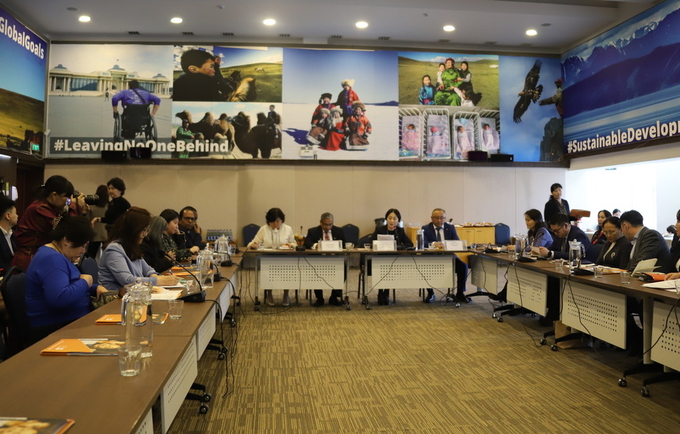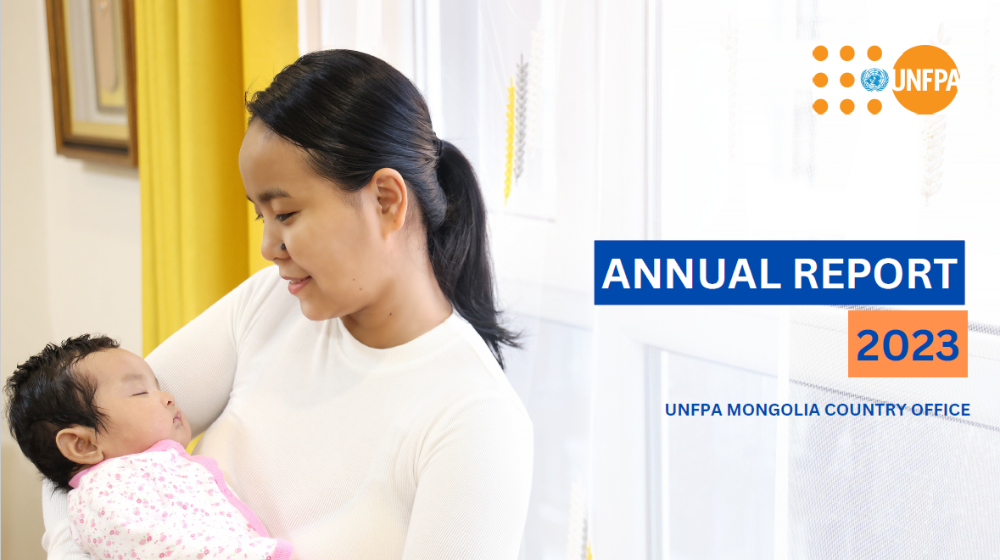UNFPA hosted a roundtable discussion on “Investment Case on Sexual and Reproductive Health” at the UN House on 17 May 2023.
The roundtable aimed to contribute to the capacity and knowledge expansion of the members of the Parliament Standing Committee on Social Policy and on the State Budget, the leadership of the ministries and government agencies, government health facilities, and professional NGOs on the usage of investment cases to increase the budget for the Sexual and Reproductive Health services in Mongolia. During the discussion, Mr. Davide De Beni, UNFPA Asia and Pacific Regional Office adviser on Health Economics, shared the findings and knowledge on the importance of investment cases.
The discussion was opened by the United Nations Resident Coordinator for Mongolia Mr. Tapan Mishra, who highlighted the importance of this investment case. “Investing in ending unmet need for family planning and ending preventable maternal deaths can lead to a twelvefold return in economic benefits, due to the reduction of unintended pregnancies and improved maternal outcomes. Providing women and adolescents with access to high-quality, rights-based contraceptive services, will reduce unintended teenage pregnancies and ensure that girls can continue their education, develop their professional skills, and increase their participation in the economy and society,” he pointed out.
An investment case is an advocacy tool that can be used to demonstrate the cost and value of the investment and identify financial gaps and the necessary resources and commitment required to shift public health management and planning to achieve the SDGs. It targets governments and donors, and the evidence is presented in financial and public health gains.
In partnership with the Burnett University of Australia, UNFPA Asia and Pacific Regional Office has developed an investment case unique for Mongolia on expanding the access to and utilization of Sexual and Reproductive Health services, including family planning. The investment case was estimated using the data from the national health statistics and Social Indicators Sample Survey findings and demonstrated the benefits of investing in the SRH.
UNFPA in Mongolia
UNFPA Mongolia began supporting the Government of Mongolia in the late 1970s providing equipment and training to the Central Statistics Office to undertake the Population and Housing Census of 1979 – and again in 1989. Support for maternal and child health began in the early 1990s and included training for medical personnel and the provision of modern contraceptives.
The first comprehensive Country Programme between the Government of Mongolia and UNFPA officially started in 1992. It focused on the delivery of family planning services and information, and the promotion of population data usage to support the government’s development policies and programmes.
UNFPA’s 7th Country Programme in Mongolia started on 1 January 2023 for a period of five years and it focuses on strengthening national and subnational policies and programs to ensure access to high-quality sexual and reproductive health services for marginalized groups; promoting gender equality and women's empowerment through evidence-based policies; enhancing the prevention and response to gender-based violence with a focus on marginalized populations; increasing access to comprehensive sexuality education and skills development for young people; and utilizing disaggregated data and demographic analyses for the development of inclusive and equitable policies and plans that respond to population dynamics and megatrends.



![South-to-South Cooperation on Telemedicine Experience Mongolia and the Islamic Republic of Mauritania [September 16-23, 2023]](https://mongolia.unfpa.org/sites/default/files/pub_homepage_cover/untitled_design_6_3.png)
